Pchum Ben – Cambodia’s Sacred Ancestors’ Festival
If you’re in Cambodia during the rains of September and chatting to locals, chances are you’ll hear about Pchum Ben. It’s not just another holiday on the Cambodian calendar – it’s one of the most important spiritual festivals in the country. Known as Ancestors’ Day, Pchum Ben is a deeply meaningful celebration where Cambodians honor their ancestors, connect with family, and practice Buddhist traditions.
This guide explains everything you need to know about the festival, including when it takes place, its history, what it signifies, and how you can respectfully experience it as a visitor in Cambodia.
For a quick FAQ guide to this important Cambodian holiday, scroll down to the bottom of the article!
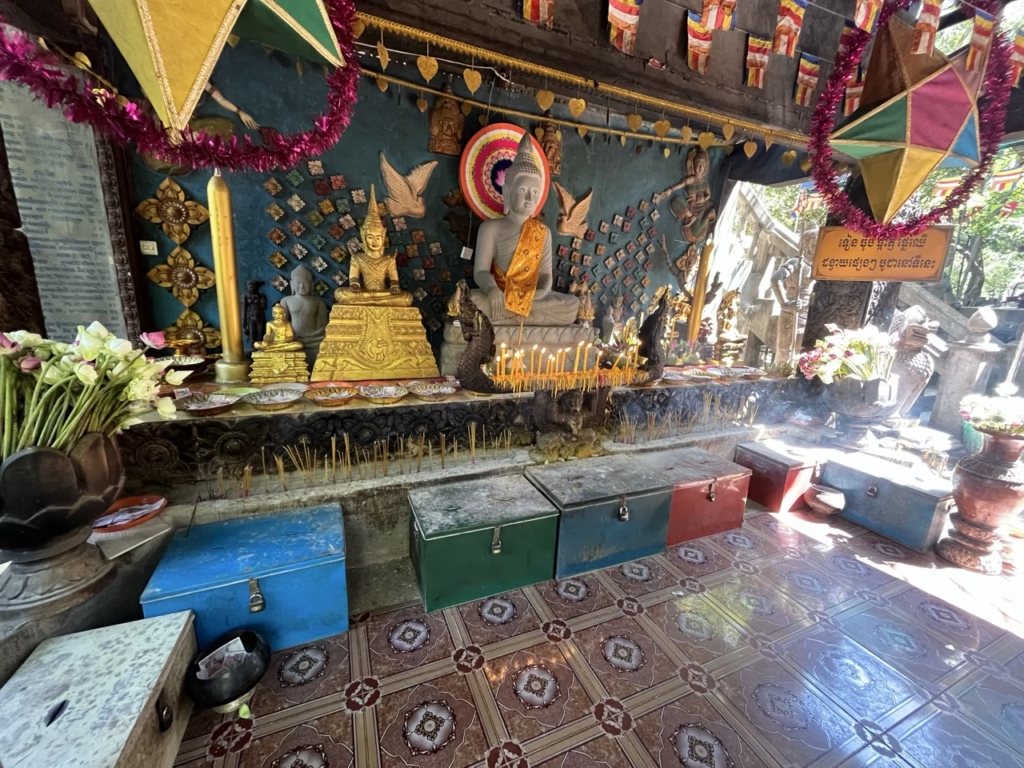
What is Pchum Ben?
Pchum Ben (pronounced pchum bun) is a Cambodian religious festival that combines Buddhist beliefs with older Khmer traditions of ancestor worship. The name roughly translates to “gathering together to make offerings,” which is exactly what happens: families bring food and offerings to pagodas (buddhist temples) to honor up to seven generations of ancestors.
Cambodians believe that during this time, spirits are able to leave the spirit world and roam the earth. By making offerings, families help ease their ancestors’ suffering and ensure good karma for the living.
When is Pchum Ben Celebrated?
Pchum Ben (like most Cambodian holidays) follows the Khmer lunar calendar, so the dates change each year. The festival usually falls in September or October and lasts for 15 days. The main part of Pchum Ben festival 2025 will commence on September 21st until September 23rd.
The beginning of the 15 days of Pchum Ben 2025 officially commences on September 8th.
- The 15 days of the festival are called Dak Ben, where many families visit pagodas daily (or as much as they can) to make offerings.
- The final day, known as Ben Thom (or “big offering”), is the last and most important day of the festival.
For travelers, this means:
- Cities with a lot of economic migration like Phnom Penh can feel quieter, as many people return to their home provinces to be with family.
- Pagodas and the surrounding areas are especially busy, with ceremonies, chanting, and food offerings.
- Siem Reap gets a big influx of travelling locals wishing to visit the Angkor Wat temple complex or see their families
- Some smaller businesses and banks may close, particularly outside tourist areas. Although this is not super common in modern times and you won’t find everything closed, it’s worth noting! Most businesses will remain open.
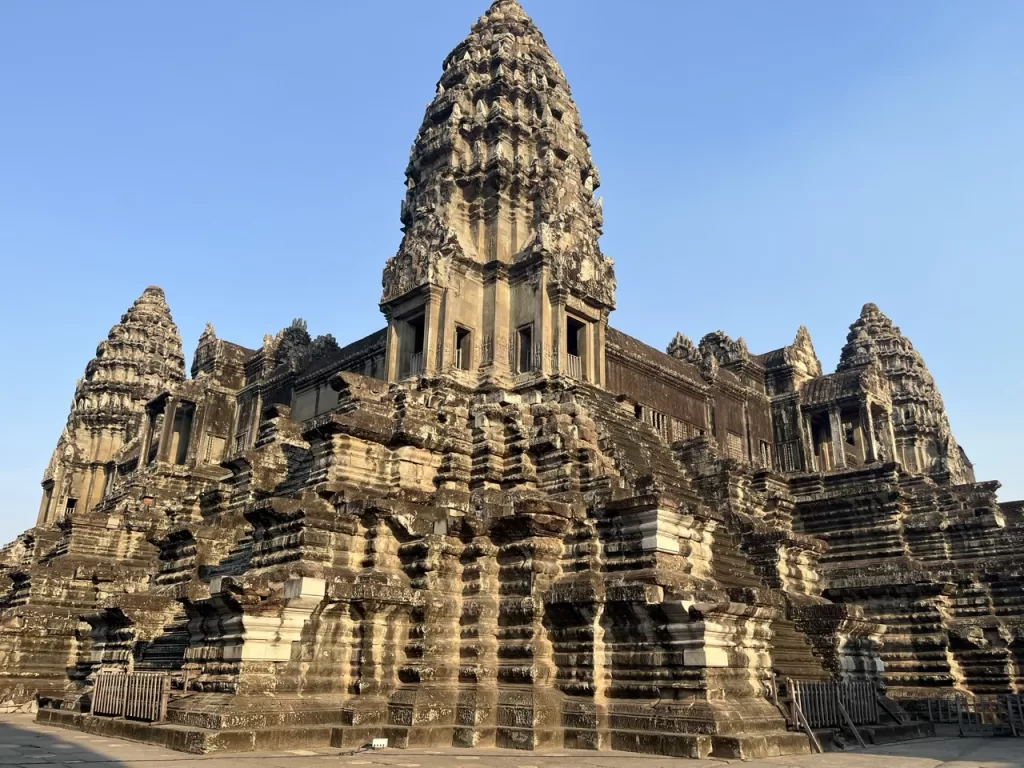
The History and Origins of Pchum Ben
The origins of Pchum Ben in Cambodia go back centuries and mix several traditions:
Pre – Buddhist ancestor worship: Ancient Khmer people believed spirits could influence the lives of the living if not properly honored.
Hindu influences: During the Angkor period, Hindu rituals merged with local beliefs.
Buddhist teachings: In Theravada Buddhism, stories of the preta (hungry ghosts) describe souls who suffer due to past misdeeds. Through offerings and chanting, merit is transferred to these spirits to ease their suffering.
This blend of traditions created the modern festival of Pchum Ben, where Buddhist rituals are combined with traditional Khmer cultural practices.
How Cambodians Celebrate Pchum Ben
Pchum Ben is both a religious and family – centered event. Here’s what typically happens during the days of the festival:
Visiting Pagodas
Cambodians wake early to bring food, rice, and offerings to the pagoda. Monks chant prayers, and families dedicate the merit to their ancestors. It is more likely that you’ll encounter older generations of Khmer practicing this, but people of all ages will be engaged in this aspect of the tradition.
Throwing Rice Balls (Bay Ben)
One of the most interesting and distinctive rituals is throwing sticky rice balls into the air or onto the ground around the pagoda. This symbolic act feeds wandering spirits who may not have family to make offerings for them.
Wearing White Clothing
White is often worn during Pchum Ben. In Khmer culture, it represents mourning and purity, making it especially meaningful during ancestor ceremonies. Again, it’s more likely that you’ll see older generations of Khmer people engaging with this aspect of the tradition, but the tradition continues nonetheless.
Family Reunions
Like Christmas or Thanksgiving in the West, Pchum Ben is a time for family. Relatives gather, cook traditional Khmer food, and spend time together. Many city workers travel back to their home provinces to join their families. During this holiday, it’s common practice for large families to gather together, most importantly to eat together and honor their ancestors.
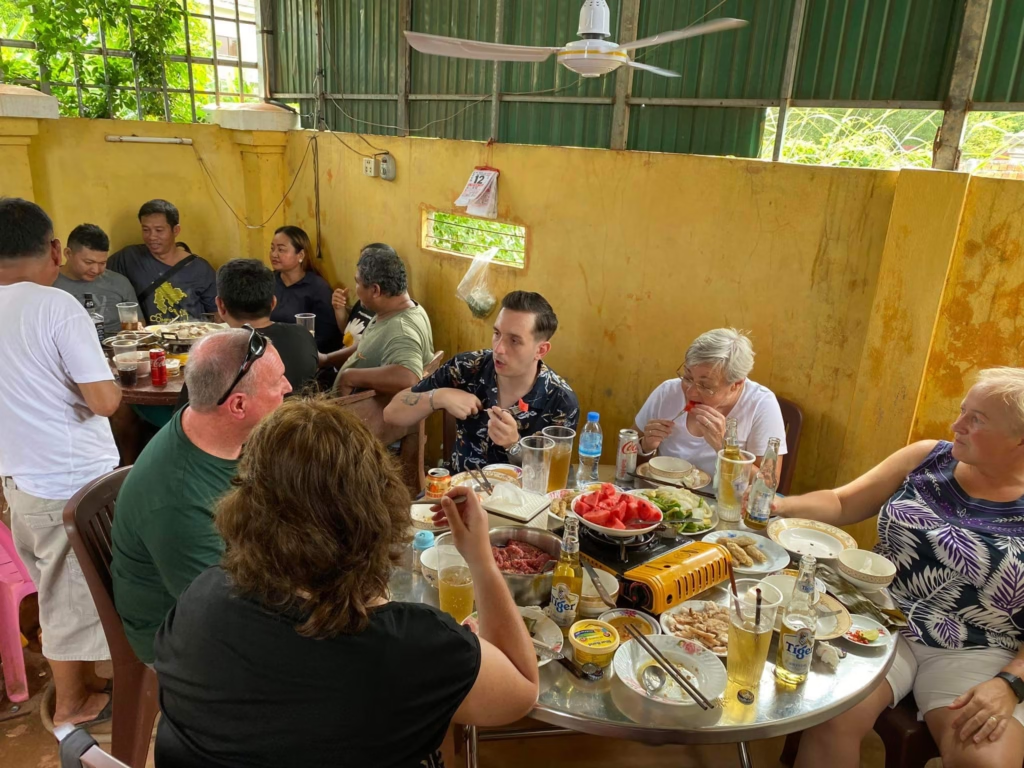
Why Pchum Ben Matters to Cambodians
For Cambodians, Pchum Ben isn’t just about a religious practice they feel obligated to adhere to – it’s about respect and gratitude. The festival reinforces the importance of honoring ancestors, maintaining family bonds, and practicing compassion.
It also shows how central Buddhism in Cambodia is to everyday life. Pagodas become community hubs, monks play a guiding role, and traditions are passed from one generation to the next. The ideas of respect, gratitude, and karma are heavily centred in Khmer culture.
Experiencing Pchum Ben as a Visitor
If you’re traveling in Cambodia during Pchum Ben, you’ll have the chance to experience some aspects of a festival that’s both spiritual and cultural. Here are some tips:
Expect possible closures: Banks, government offices, and some shops may close, especially in rural areas. As I said earlier, this is less common in modern times, and most places will stay open in busy or touristic areas. However, don’t be surprised if you head to your local mom and pop shop for a bag of chips and they’re shut!
Book transport early: Bus tickets and flights can sell out as Cambodians travel home. Many Cambodians work in different regions to their hometown, and during Pchum Ben a lot of them will want to return home to celebrate with their families.
Observe respectfully: Visitors are generally welcome at pagodas, but dress modestly and behave respectfully during ceremonies. In particular, be respectful when visiting or taking photos at religious sites, but this should go without saying! Don’t forget, this is a busy period for pagodas, so be sure to give priority to those who are there to practice their traditions.
By observing respectfully, you’ll be able gain a deeper understanding of Cambodian traditions. If you’re inquisitive, ask questions! Cambodians are generally very friendly and many people will gladly talk to you and help you to understand their culture and traditions.
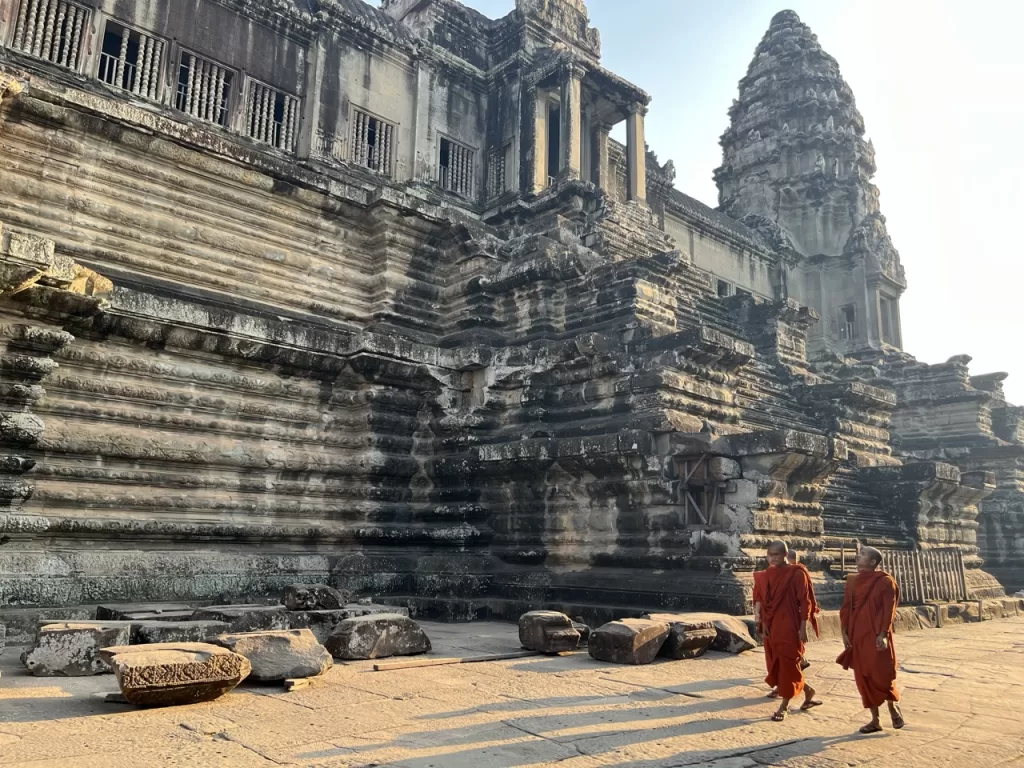
Related Cambodian Festivals
While Pchum Ben Festival is unique, it connects culturally with other Cambodian celebrations:
Chaul Chnam Thmey (Khmer New Year) – In April, families also honor ancestors and celebrate new beginnings.
Visak Bochea Day – Marks the birth, enlightenment, and death of the Buddha.
Kathina Ceremony – Occurs after Pchum Ben, where monks receive new robes and donations from the community.
Together, these festivals highlight how spiritual life shapes Cambodian culture throughout the year.
Pchum Ben is one of the most significant holidays in Cambodia (there are many!), blending Buddhist traditions, Khmer culture, and family life into a festival of respect and remembrance.
👉 To read all about the Cambodian holidays throughout the year, check out this article!
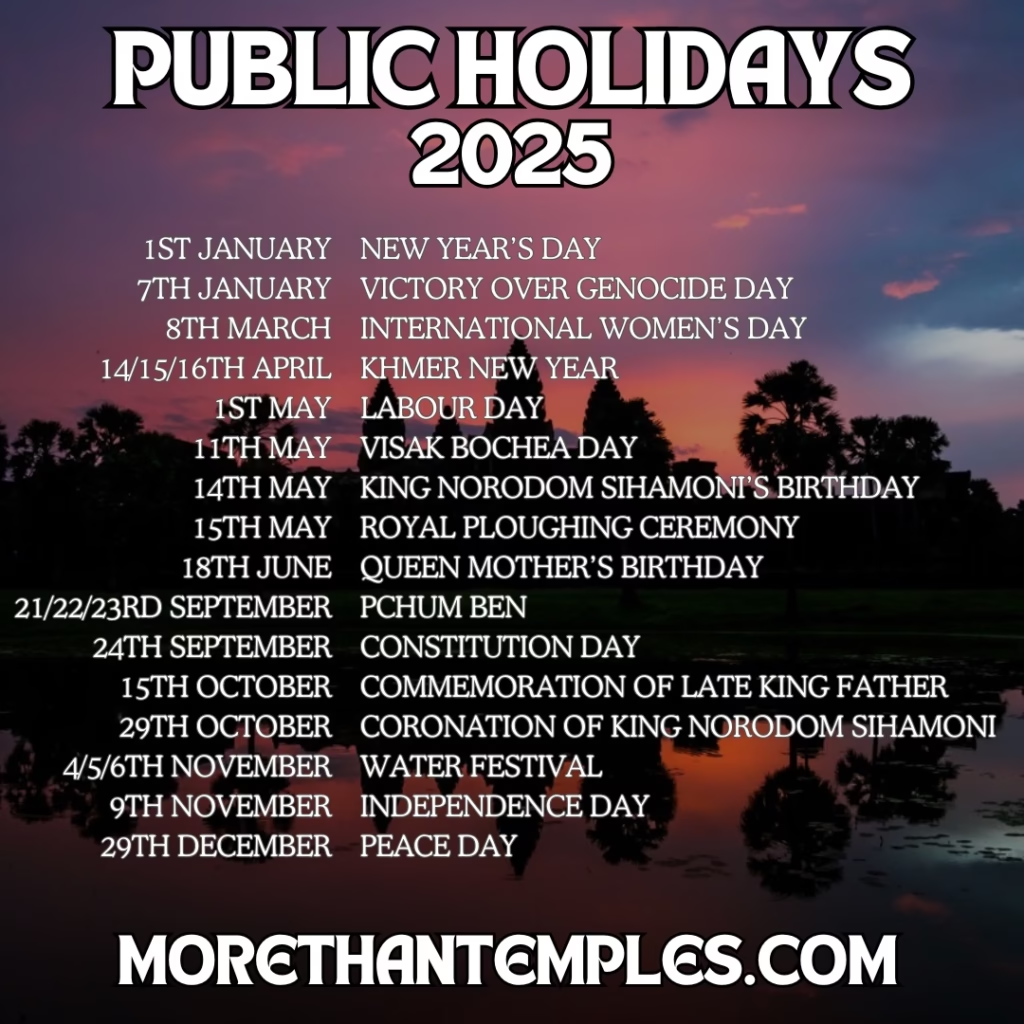
Pchum Ben FAQs
What is Pchum Ben in Cambodia?
Pchum Ben is a 15-day Cambodian religious festival, also known as Ancestors’ Day. It’s when Cambodians honor their ancestors by visiting pagodas, making food offerings, and practicing Buddhist rituals to transfer merit to the spirits of the dead.
When is Pchum Ben celebrated?
Pchum Ben takes place in September or October, depending on the Khmer lunar calendar. The festival lasts for 15 days, with the final day, called Ben Thom, being the most important. In 2025, Pchum Ben will begin on September 8th, with the main Pchum Ben festival and holiday occuring from September 21st to September 23rd.
Why do Cambodians celebrate Pchum Ben?
Cambodians celebrate Pchum Ben to honor up to seven generations of ancestors. It’s believed that during this time, spirits are able to wander the earth, so offerings help ease their suffering and bring good karma to the living.
What do people do during Pchum Ben?
Cambodians visit pagodas to offer food to monks, throw rice balls (bay ben) to feed wandering spirits, wear white clothing, and reunite with family members for food and celebration.
Can tourists join Pchum Ben celebrations?
Yes, tourists are welcome to observe Pchum Ben respectfully. Visitors can join locals at pagodas, but should dress modestly, behave politely during ceremonies, and ask before taking photos.
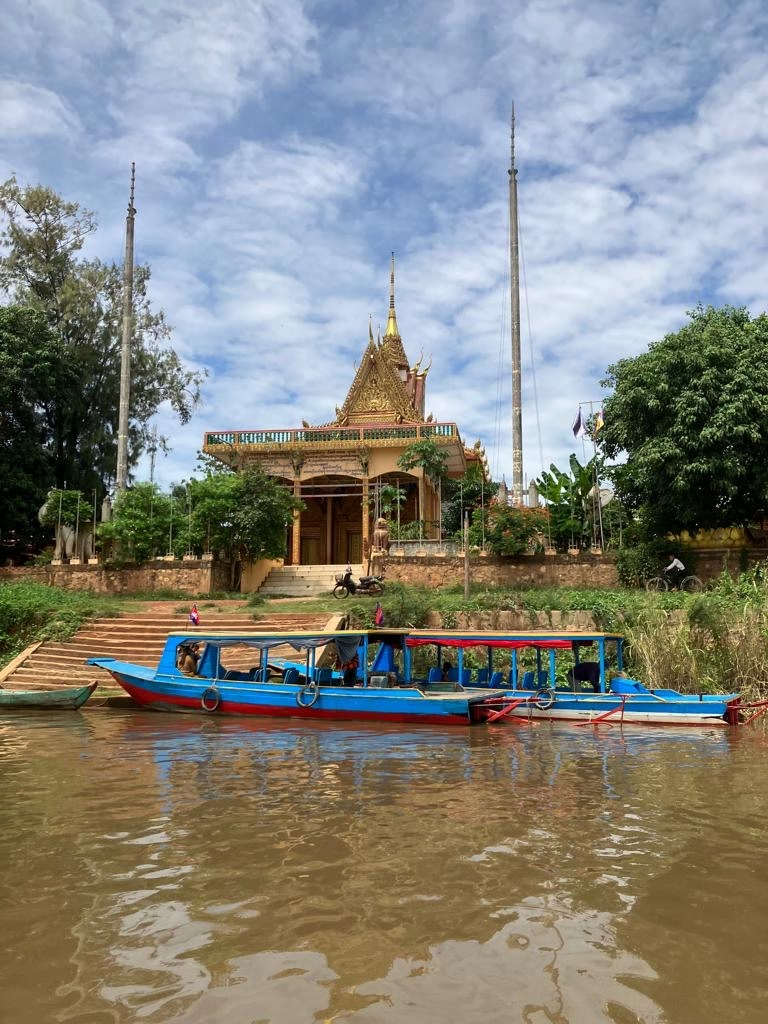
For more great information or recommendations from our Siem Reap travel guide and for tips on Cambodia in general, don’t forget to follow our Instagram, Facebook, YouTube and TikTok accounts for regular fun and updates!
@morethantemples
Thinking about a trip to Cambodia and looking for someone to help plan your itinerary, or just looking for someone to take you to places you won’t find on regular tours? CLICK HERE to visit our “Tours” page and get in touch. Nightlife tours also available!
Any information in the article above was correct at the time of posting to the best of our knowledge. If you notice any issues or would like to chat to us about the article please get in touch with us via our “ABOUT” page. If you’re the owner of a business we’ve written about and would like to discuss any out of date or incorrect information, please get in touch and we’ll be more than happy to help! Any opinions expressed in our articles are our own and may not be representative of everyone’s experience.
If you found this article helpful, please consider heading to our ABOUT page by CLICKING HERE, and leaving us a tip via BuyMeACoffee!



